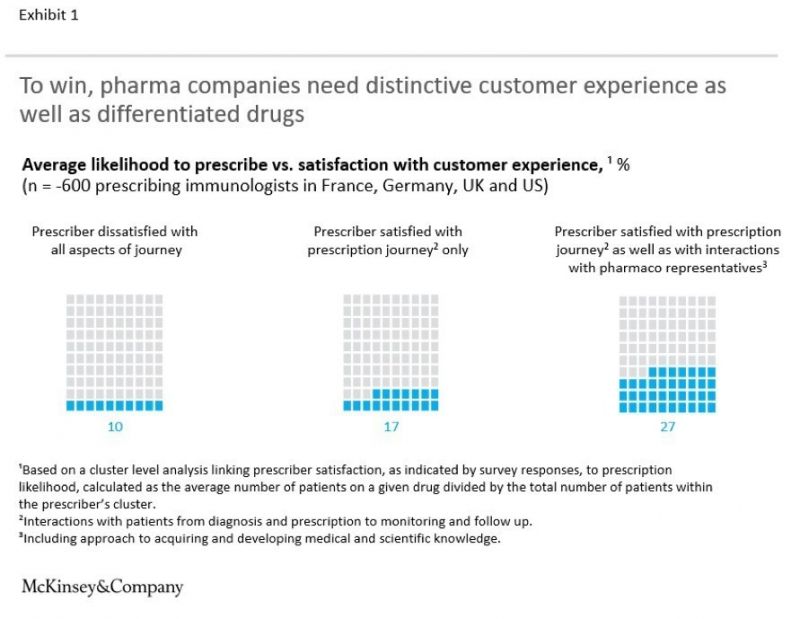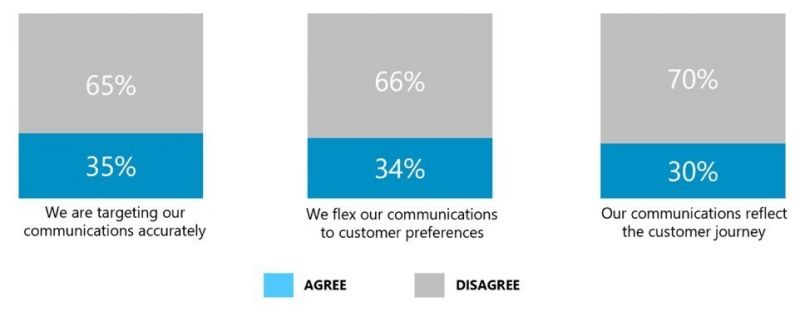Combining customer experience and precision marketing
Just about every service organisation in the world is looking to improve their customer experience in order to set them apart from the competition. We all know personally how a great experience can influence our loyalty and how a bad experience can stop us buying.
We know that understanding the customer experience in Pharma and using this to inform strategic choices, innovate the brand and define your value proposition is important.
We can also see how a great customer experience is important in a hospital or a specialist clinic setting, especially when the patient has the ultimate decision of where to receive treatment.
When it comes to activation, though, the power of a great customer experience for Healthcare professionals isn’t quite so obvious.
Healthcare professionals’ interactions with Pharma companies are limited:
- Face to face conversations are often short, crammed in as part of a busy day dealing with real patient issues;
- Remote discussions such as phone services tend to be about resolving a current challenge that is already causing frustration, such as completing paperwork;
- Digital interactions tend to be focused on finding or requesting medical information about products;
- Typically, only those involved in clinical trials spend any quality time with Pharma company staff;
There seem to be few opportunities to build a relationship or provide a differentiated positive experience, and yet we know, that every interaction counts.
So we searched to see what evidence there is that a positive HCP customer experience really makes a difference in Pharma?
- Some sources, for example, the McKinsey report “The importance of customer experience in developing Pharma products” (1) suggest a positive experience increases the likelihood to prescribe.

But it doesn’t seem to be a silver bullet!
Others (2) state that bringing new medicines to the market and ensuring they are available for doctors to prescribe is only part of the challenge the industry faces – it’s no longer enough to simply offer products to healthcare professionals.
Research conducted by Aptus Health recently into The State of Customer Experience in the Pharmaceutical Industry, has shown that the vast majority of the global HCPs in its Univadis online community have three key expectations of the interactions they have with pharma:
Trustworthiness;
Relevance;
Simplicity.
That is to say, pharma must attract doctors and engage them with content that is trustworthy and valuable, and then build this relationship over time.
Whilst we agree with the sentiment, the proof doesn’t seem conclusive, so we are left believing that it must be a good idea but not quite sure what difference it will make.
What we do know is that many busy doctors and nurses receive too much information and use digital in preference to paper:
- Stop the paper abuse! Data is now digital in most of the healthcare system. (3)
So much information gets left for me that it ends up in the trash. Send it to me electronically and I may open and read it.
- According to HealthLink4 Dimensions’ 2017 Healthcare Provider Communication Survey, around 66 percent of physicians consider email to be their preferred means of interaction when it comes to information related to product updates or announcements.
When it comes to designing your activation plan for Healthcare Professionals, it needs to be grounded in the customer experience, but, then needs to go further to tailor communication channels and messages by segment.
We also know that often, when companies test the recall of their sales messages, doctors do not recall the right messages against the right brand.
So, it seems to us, that when it comes to designing your activation plan for Healthcare Professionals it needs to be grounded in the customer experience, but, then needs to go further to tailor communication channels and messages by segment.
Before Pharma starts to focus on integrated, service industry type experience building, there is still more to do to understand what customers actually want from each of their interactions with the company and what channels will work best for each type of interaction.
Other industries are way ahead on tailoring their channels, messages and tonality to different customers, using segmentation to inform all their communication and conversations. And yet we still know that there is more that could be done.

It feels like now is the right time for Pharma to use Customer Experience to understand the customer challenges, but, then engage fully with Precision Marketing to get the right information to each segment
It feels like now is the right time for Pharma to use Customer Experience to understand the customer challenges, but, then engage fully with Precision Marketing to get the right information to each segment and in doing this help HCPs to improve the patient experience.
If you’d like to talk more about how we can help develop your brand strategy or your multi-channel engagement approach, please do get in touch.
We’d love to hear from you - Mary.Deboos@oxfordsm.com.
If you’d like to hear more about the science behind personalised communication then watch our video 'Customer centric communication'.
References:
- McKinsey – The importance of customer experience in developing pharma products
- Aptus Health May 16, 2019 – How Pharma can excel in customer experience
- PM360 - What doctors want from Pharmaceutical Marketers
- Healthlink Dimensions - 4 best channels to communicate with physicians
- OxfordSM and Mediasense C3 communication - How your brand can become more agile and future facing and https://c3-partnership.com
Share this
You May Also Like
These Related Stories

Pharma: your customer won’t wait for you to listen to them

To prevent or to treat? The ongoing debate for healthcare

.png?width=657&height=57&name=OXFORD%20LOGO%20(1).png)
No Comments Yet
Let us know what you think